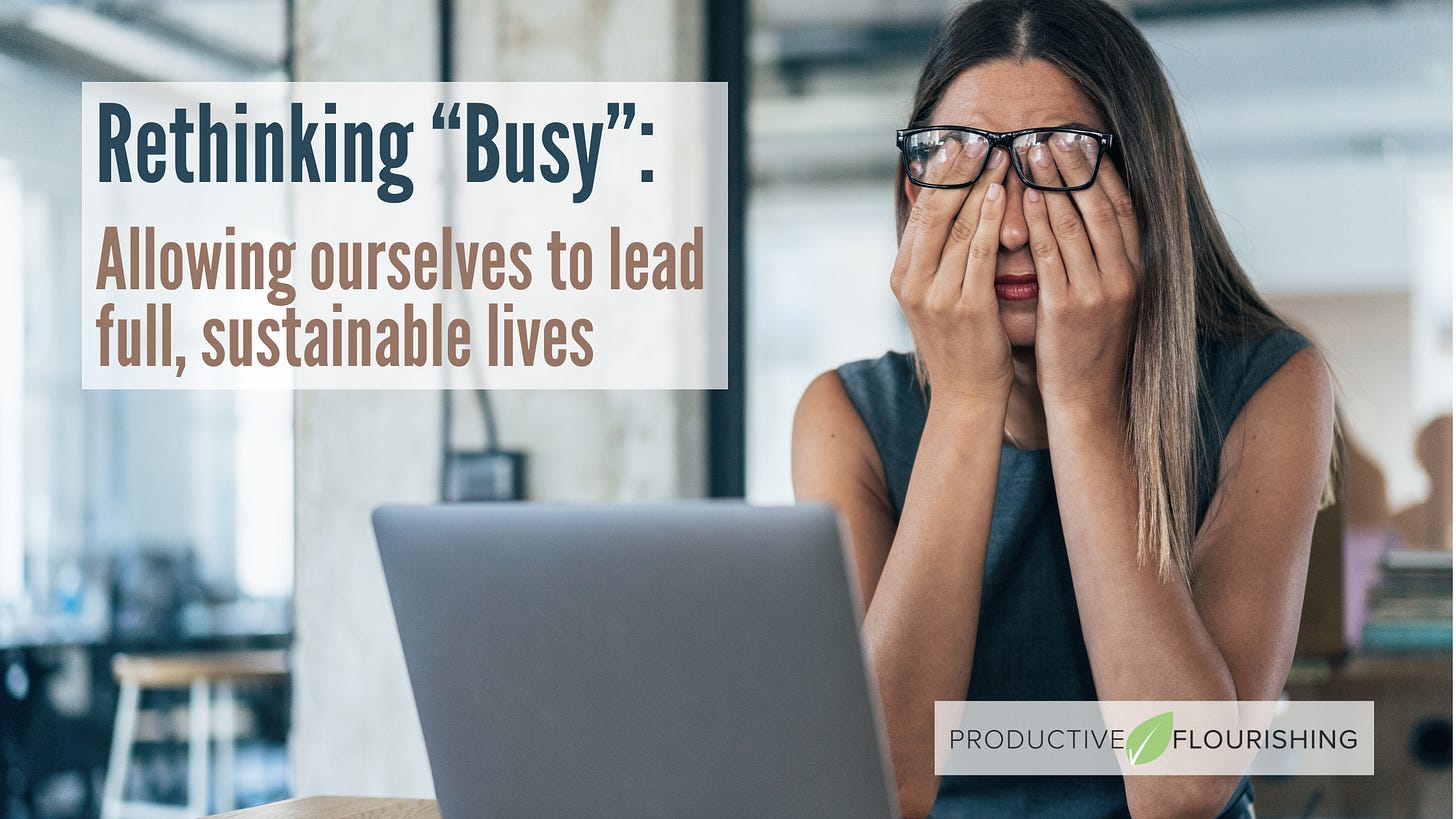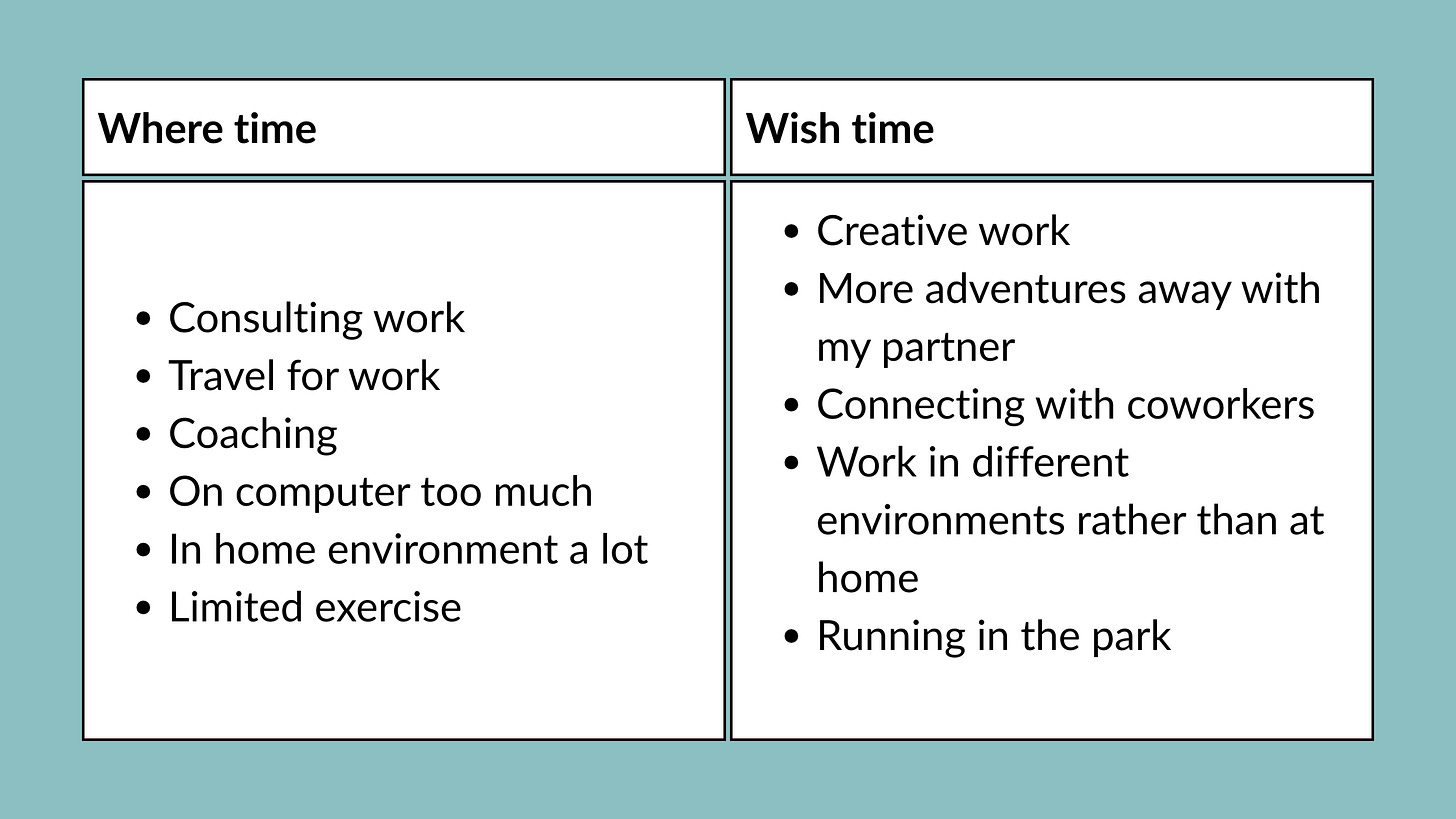Rethinking “Busy”
Allowing ourselves to lead full, sustainable lives
This is a guest post by Kathy Oneto.1
Admit it, you wish a lot for yourself and your life. Not material possessions, per se, but to lead a full, rich, vibrant life. Nothing wrong with that!
Yet in today’s environment such ambition can easily turn into overwhelm. We get pulled to do it all, do it all now, and put our professional work above what’s important to us personally. The resulting incessant busyness can create feelings of frustration and impatience as we struggle to fit everything in. We make comments like, “I have to get so much done!,” “Ugh, I can never get to that,” or “I can’t wait for this busy time to be over.”
For example, you may be like one of my workshop participants who had a lot of interests and goals she wanted to pursue over the course of a year and realized in mapping it out, “My one-lane road map turned into a bumper-to-bumper, four-lane highway!”
You might be like a client who was managing professional demands with family life and could never get to her personal list of must-do’s unless she took days off work.
Or you might be like me, juggling multiple creative projects and constantly thinking that once you get through this launch or deadline, then you can focus on what really matters.
We often assume we have to trade-off leading a rich, ambitious life and feeling sustained and at ease. But what if there’s a way to pursue our ambitions without feeling so much tension and angst? What if we could allow ourselves to lead full lives with more joy, peace, and ease?
Three strategies can help us move from feelings of reactive busyness to more conscious, choiceful living.
1. Reframe “Busy” as “Fully Alive”
I asked a woman I was interviewing which three adjectives she would use to describe her life. She was a mom with three kids and was also starting a business. The first word she thought of was “busy.” “Oh, but I can’t say that,” she said, considering it an inappropriate answer, as if it were something to be ashamed of.
We’ve made “busy” the new four-letter word — and while it literally is, it doesn't deserve to be treated like one. What if we’re mischaracterizing the state of our lives? What if instead of being “busy,” we’re actually leading a fully engaged, wholehearted life?
The actress Juliette Binoche captured this beautifully in a New York Times interview when the journalist asked her “if she always liked to be this busy.”
“I wouldn’t call myself busy,” Binoche objected. “More creative than busy.”
The difference, she explained, was that busyness is like “trying to fill up empty space,” whereas being creative “pushes you up into a space where you feel alive and present and discovering and revealing yourself.”
This distinction is important. When we’re filling empty space, we’re reacting — saying yes to activities in our lives without intention. When we’re being creative, we’re choosing — engaging in pursuits that help us explore who we are and who we’re becoming.
Instead of saying “I can’t wait for this busy time to be over,” we might ask ourselves: Am I simply filling empty space, or am I putting my effort toward activities I’ve deliberately chosen that make me feel alive and resonate with who I am? If it’s the latter, perhaps we can allow ourselves to fully enjoy living our exploration.
2. Be Deliberate with Your Focus
The above inquiry naturally leads to the second strategy: becoming more intentional about how we use our time and effort. As Henry David Thoreau wrote, “It is not enough to be industrious... What are you industrious about?”
The key is moving from being on autopilot to making conscious choices. Oliver Burkeman wrote in a 2016 Guardian article that focusing solely on time and productivity management can distract us from asking the important questions: “Which paths will you pursue, and which will you abandon? Which relationships will you prioritize, during your shockingly limited lifespan, and who will you resign yourself to disappointing? What matters?”
This means we inevitably need to ask the questions we might be avoiding and let go of pursuits to focus on what matters most now.
Making conscious choices means regularly checking in with yourself: What do I want to be industrious about? Where do I want to put my time, energy, and attention? What will I say no to and subtract?
3. Bridge the Gap Between Where Time and Wish Time
Even with the best intentions, there’s often a gap between how we spend our time and how we wish we spent it. That’s natural as life and work demands tug at us, or as we get into the flow of daily life. It’s hard to be consciously focused all the time. Still, the gap creates internal friction that contributes to frustration.
The good news? We have more agency around this feeling than we realize. Much of the friction exists in our minds because of the gap between our current reality and our desired reality.
A simple way to explore if you are putting your time and energy into what’s most important to you right now is through a Where Time and Wish Time exercise.
Look at your previous week’s calendar and note where you spent your time in high-level categories: work, family responsibilities (e.g., shuttling kids), specific hobbies or personal interests (e.g., creative writing, playing an instrument, woodworking), exercise, and so forth.
Now think about how you wish you had spent your time, considering what matters most to you right now.
You can create lists that might look like this or consider creating a pie chart of allocation of time put toward activities:
What do you notice? Are you aligned with your wishes, or do you see areas for adjustment? If you found alignment, how might you honor and intentionally expand on what’s working? Where do you see misalignment, and what changes do you want to make in how you use your time to create more life and work fulfillment and ease?
For example, you might notice you spent zero time on creative projects or wish you spent more time with your partner and children. Or you discovered you averaged five hours daily on your phone when you’d rather get off screens and engage in more active recovery practices. Perhaps you realized working from home all week left you feeling stale and craving more variety in your environment.
When doing such an analysis, don’t feel the need to make a dramatic overhaul of all you do. Start by identifying one small shift you can make toward where you wish you spent your time and create a structure to help support you in that change. For example, take a class to support your creative work. Or schedule a bi-weekly adventure or night out with your partner.
You might also experience what I often do — those constant tugs of frustration: “I’m working on this right now, but I really wish I were working on that other project.” In such moments, I tell myself, “There will be time for that,” and then I immediately find a spot in my calendar for a dedicated sprint to focus on the very thing I’m longing to work on.
Move Forward with Conscious Choice
Leading a rich, ambitious life doesn’t have to result in feeling overwhelmed or stretched thin. When we reframe our full lives as “alive” rather than just busy, make intentional choices, and align our time with our priorities, we step into a different way of living and being.
By regularly checking in with yourself and making small, conscious adjustments to align your time with what matters most, you can allow yourself to pursue your ambitions with more joy, peace, and acceptance.
Kathy Oneto is an executive and life-work coach, speaker, and facilitator whose mission is to help ambitious individuals, organizations, and teams explore how to live and work differently for more success, satisfaction, and sustainability. She is the founder of Sustainable Ambition®, host of the Sustainable Ambition podcast, and author of the book, Sustainable Ambition: How to Prioritize What Matters to Thrive in Life and Work (June 2025).
With a portfolio career and drawing from her 25-years of experience, she is also a strategy consultant and advisor who partners with ambitious organizations and leaders who want to do better for their business, customers, and people — helping them illuminate and make progress on what matters.




